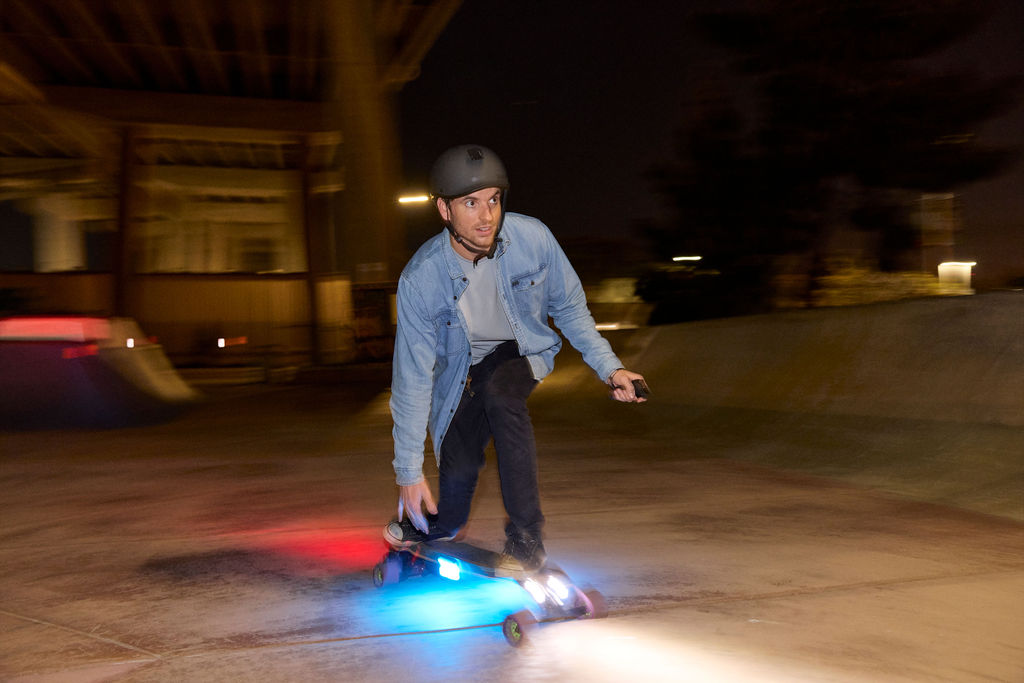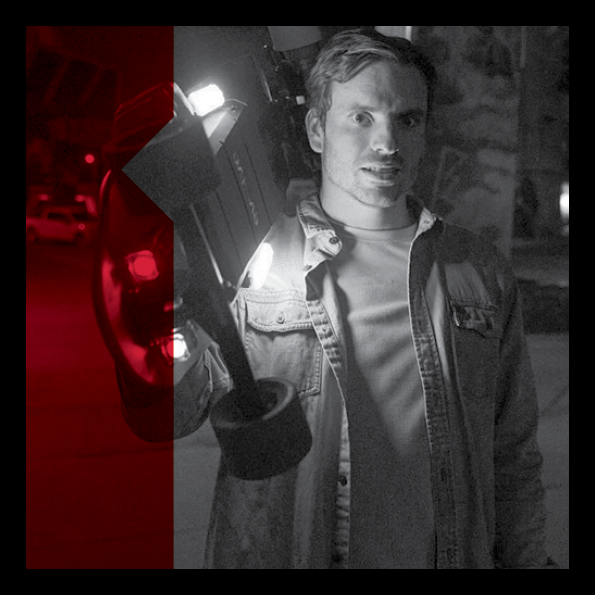The Pivotal Moments Behind the Success of Five SDSU Entrepreneurs
Entrepreneurship initiatives at SDSU have launched hundreds of one-of-a-kind ideas — think health-care apps to blister-proof socks — and with the establishment of Techstars San Diego powered by SDSU in late 2023, there is even more to come from SDSU students and alumni.

To be clear, the Zahn Innovation Platform Launchpad — also known as the ZIP Launchpad, San Diego State University’s startup incubator — maintains normal weekday business hours. Fortunately, when Eric Birkemeier was launching his skateboard and bike lights business ShredLights in 2017, he possessed an ace up his sleeve: a classmate and business partner who worked there part-time.
Birkemeier would often be out with friends on a Friday or Saturday night, when his timer would go off, informing him it was time to get to work.
“It'd be like, ‘Oh, the 3D prints are done,’” Birkemeier says with a smile.
So with business partner Kyle Kitzmiller’s card in hand, Birkemeier would skate across campus to the ZIP Launchpad, switch out the prints and start a new batch. Then it was back on his board and back to his weekend fun.
ShredLights is just one of the many successful companies that SDSU’s entrepreneurship initiatives have helped students launch over the past decade-plus.
“Many of the problems students are looking to address are around areas that, if solved, would make a big difference in society,” says Cathy Pucher, SDSU’s executive director for entrepreneurship initiatives. “But they are also solving problems that are figuratively and literally 10 feet in front of them. ShredLights is a great example.”
Pucher started at SDSU 12 years ago to lead what was then called the Zahn Center, which at that point had been open for a year and had a mere four ideas being incubated. Since, the ZIP Launchpad, originally supported by the late Irwin Zahn and now by his son Peter Zahn, has helped develop almost 500 ideas and launched approximately 40 startups, which have raised about $40 million from investors.
“I really just appreciate that the ZIP Launchpad kind of gives you guardrails in a sandbox,” Birkemeier says. “It was like, just go in there and experiment and fail, you know?”
It’s one of three major entrepreneurship initiatives thriving at SDSU. There’s also the Lavin Entrepreneurship Center, which was funded by the late SDSU supporter Leonard Lavin in 2012 with a significant gift, that focuses on teaching the entrepreneurial mindset through curriculum, mentorship and other resources. And last year saw the inaugural class of Techstars San Diego powered by SDSU, an accelerator that seeks to attract promising startups to San Diego. Techstars will eventually be a part of the forthcoming Innovation District at SDSU Mission Valley.
"This is what I live for — it’s why I’m here,” Pucher says. “It’s not just seeing the ideas, it’s seeing the people behind it.”
Here are five SDSU alumni and their entrepreneurship success stories.

Aztec Entrepreneurs: Eric Birkemeier (’17) and Kyle Kitzmiller (’13)
To an electric skateboarder, there’s nothing quite like riding at night.
After all, battery-powered boards are more than twice as fast as traditional skateboards, meaning it’s best to ride on the road. And after dark is when the roads are empty.
Of course, it’s also when they’re most dangerous.
Fortunately, Eric Birkemeier and Kyle Kitzmiller have taken a company from humble origins at the ZIP Launchpad more than a decade ago into one that is helping countless skateboarders safely navigate the darkness. ShredLights sells durable wireless LED headlights and taillights that can be attached to skateboards, bikes and other portable electric vehicles.
For Birkemeier, who grew up immersed in skate culture in Minnesota, the business is a true labor of love.
“It’s really rewarding hearing about people going out to ride at night for recreation that normally wouldn't,” says Birkemeier, who also spent time in the Lavin Entrepreneurship Center. “It's a really fun outlet, especially in the winter months when that seasonal depression hits. So it’s not only protecting people, it’s [also] enabling people to get out there.”
Three things to know about ShredLights:
A bold decision propelled them.
Around 2016, ShredLights was floundering. Focusing on selling lights to street skaters, the company had sold a mere 50 units, and its original founder, Drew Page, had moved on to other opportunities. That’s when Birkemeier and Kitzmiller grappled with a difficult question: What if they were targeting the completely wrong market? After all, they reasoned, street skaters were out to look cool, and lights on your board didn’t exactly align with that ethos. Perhaps longboarders — who skate more for transportation than tricks — would be more receptive. The pivot proved to be a turning point.
Their timing was impeccable.
ShredLights’ marketing shift happened to coincide with the rise in popularity of Boosted Boards, a Silicon Valley–based electric skateboard manufacturer. Birkemeier and Kitzmiller scraped together enough money to buy a $1,300 board and retooled their product to fit. Soon — without the help of any paid advertising — ShredLights went viral, and sales started to double every month. The problem was no longer selling units, it was keeping up with demand. During the height of the COVID-19 pandemic, as the public’s interest in safe outdoor activities boomed, ShredLights hit $1.5 million in revenue.
ShredLights is always looking for what’s next.
Currently 70% of ShredLights’ business comes from electric skateboard products, though the need to diversify is clear to Birkemeier. Boosted went bankrupt in 2020 and was sold, causing the electric skateboard market to contract. So ShredLights is looking for opportunities to pivot again, and its latest innovation may be the key. Using Bluetooth wireless technology, all its lights can now be controlled via a smartphone app. Birkemeier is eager to explore if this might have applications in other markets.
“I was able to meet a lot of other student entrepreneurs at the ZIP Launchpad that I’m still friends with. It’s a magnet for people like me who want to start something and kind of have this different sort of personality — everyone’s like-minded and doing cool stuff.”

ReliaCare
Aztec Entrepreneur: Margaret Yoo (’23)
It's a thrilling time to be Margaret Yoo.
The recent graduate of SDSU’s interdisciplinary master of engineering program is on the cusp of turning an idea she developed for a medical device design course into a mobile application with the potential to help surgery patients address dangerous complications. Yoo’s app is ReliaCare, which is designed to guide patients through their pre- and post-operation experience with an eye on improving outcomes.
This spring, she is starting the validation process for the app in conjunction with orthopedic surgeon Dean Wang at the University of California, Irvine. Meanwhile in March, she traveled to South by Southwest in Austin in hopes of drumming up additional investment.
If the stars align, ReliaCare could be released to the public by the end of the year.
“To be honest, I feel like I could cry,” Yoo says. “I never thought that this would be a possible journey for me. To think that just one patient could have better access to information, or just feel a little bit more comforted through the process, is so exciting.”
Three things to know about ReliaCare:
The app puts critical information at patients’ fingertips.
ReliaCare guides patients through the post-op and recovery processes by providing easy-to-understand information and step-by-step instructions for all actions that need to be taken at home. Patients can also reach out to providers through a streamlined messaging tool that triages critical information so health-care professionals know what they need to respond to first.
The idea stemmed from a post-surgery horror story.
The business started in an unexpected place: the volleyball court. An avid player who still competes on the Mission Beach sand, Yoo has undergone multiple knee surgeries to repair torn ligaments. One such procedure resulted in a frightening trip to the emergency room because of complications and unsuccessful attempts to reach her surgical team. In her panic, unsettling possibilities crept in. What if she could never play volleyball again? What if she lost her leg? Fortunately, Yoo recovered, but it got her thinking about how the harrowing ordeal could have been avoided.
Classroom encouragement made the difference.
Yoo first presented the idea for ReliaCare in a Design of Medical Devices course taught by SDSU lecturer Vuk Uskokovic. When Uskokovic told Yoo it was an idea she should pursue, she initially thought he was just being nice. But a subsequent email from Uskokovic urged her to seek out campus support to help actualize the concept. Yoo discovered the ZIP Launchpad, which provided her both mentorship and app-development resources.
“At the ZIP Launchpad, you spend an entire semester just understanding the problem. And then — step by step — building a prototype and then validating that prototype before you actually develop something. It’s so beautiful. Because it’s what we should be doing all the time.”

Aztec Entrepreneur: Arman Assadi (’09)
After graduating from SDSU, Arman Assadi had an incredibly fortuitous path.
Entering the real world amid the global financial meltdown, he was connected to the multinational conglomerate 3M by one of his professors. What was supposed to be an internship became a full-time job with a company car, company credit card and an exciting life in New York City. Two years later, the tech giant Google — then at the zenith of its prestige — came calling and brought Assadi to the Bay Area.
It would be hard to imagine a more auspicious start to a professional career.
So why, after five years working in the Fortune 500, did Assadi suddenly quit and run off to Cuba to ponder his next move over a Hemingway daiquiri?
“My major in entrepreneurship kind of gives you the hint,” says Assadi, who admits he has long had something of a rebellious personality. “I’ve been an entrepreneur for 12 years and haven’t looked back.”
Assadi has founded multiple businesses at the intersection of media, the creator economy and technology. His latest business — and his first backed by venture capital — is Steno.ai, which allows brands and creators to increase reach, revenue and retention using artificial intelligence.
How has the entrepreneurial turn suited him?
“It’s been amazing,” he says. “I'll never have another job.”
Three things to know about Steno.ai:
The vision is to democratize knowledge.
Assadi grew up reading a lot of books, and he still loves to read. But these days, he says, cutting-edge information is just as likely to be locked away in a podcast episode, a YouTube video or a 30-second TikTok post. Steno.ai aggregates content from a client's various platforms — be they YouTube videos, podcasts, online courses or books — into an embeddable multimodal experience.
Techstars led to transformation.
Last fall, Assadi and his cofounders were part of the inaugural cohort of Techstars San Diego powered by SDSU — a 13-week accelerator experience. Their involvement also represented a triumphant return to SDSU that he called “nostalgic and inspiring.” It also changed Steno.ai. Originally, the AI tool was targeted to content consumers. During the course of Techstars San Diego, the focus shifted to serving creators.
Assadi came to SDSU at just the right time.
When Assadi was a student in the late 2000s, SDSU’s entrepreneurship programs were only starting to get off the ground — in fact, his major wasn’t even offered until his senior year. He jumped at the chance, even though it meant taking extra classes in order to earn the emphasis in entrepreneurship. He calls it a pivotal moment in his path — even if it didn’t exactly bear fruit until years later.
“Entrepreneurship is extremely difficult. When I started down this path, I just wanted freedom. And that worked for a while. But it’s a tumultuous roller coaster, and you've got to be mentally really strong. But the reward of knowing that you’re doing something and pushing yourself to your potential outweighs everything.”

Shezza
Aztec Entrepreneur: Tiffany Gil (’21)
These days, Tiffany Gil is living the digital nomad dream.
The founder and CEO of the sock company Shezza has spent much of the past year trotting the globe, from Europe to Latin America. She spends weekdays on her laptop growing her business and weekends finding adventure.
“I think it’s amazing the world we live in now with remote work,” says Gil, a 2023 business entrepreneurship graduate who participated in both the ZIP Launchpad and the Lavin Entrepreneurship Center.
It’s even more amazing to think about how her remarkable journey started — an inventive 15-year-old looking to painlessly break in her Dr. Martens.
Gil’s idea for socks with foam padding sewn in just above the heel has become Shezza, a company with a 10-person team and $500,000 in sales since its launch in 2022. Shezza sells multiple styles of socks, most coming in black and white, though she’s planning to branch out into colors this year.
More big decisions are in the offing.
"Right now I'm deciding whether I should take on capital or if I should just keep bootstrapping,” Gil says. “It's always scary, but it's very cool to know that I'm creating opportunities for people on my team. It's just a good situation.”
Three things to know about Shezza:
Entrepreneurship is in Gil’s blood.
As she set out to launch her startup, Gil had small-business inspiration to draw on. Her mother owns a barbershop, and her father owns an auto body shop. She always figured she would go into business eventually, which is what led her to choose to attend SDSU for its entrepreneurship programs.
You’ll never guess her initial source of funding.
Gil leveraged her winnings from a reality television lawn mower race. No, seriously! In the summer of 2020, she raced from Los Angeles to New York City on a riding mower as part of “The Great Grass Race.” It took two-and-a-half months and — despite not knowing how to even turn on the mower at the start — she took first place among the five contestant pairings. The show ultimately never aired, but there are clips on YouTube.
The company blew up on TikTok.
In late 2021, Gil was still looking to validate her idea at the ZIP Launchpad. That’s when a friend convinced her to post her socks to TikTok. Gil found a young woman’s video talking about her process of breaking in her Dr. Martens, complete with numbing spray, cotton balls, duct tape and two pairs of socks. Gil posted a reaction video and showed off her socks, which would still not be commercially available for eight more months. Her video went viral — it’s now up to 800,000 views — and orders started pouring in.
“Having my idea validated was a very emotional moment. I’d invested so much time, energy, money and resources. I’d been dealing with all these doubts if it was going to work out. Then, suddenly, I was able to quit my job and be a decision-maker — be a boss. It was relief times 100. It was pure happiness.”
Apply for SDSU’s Entrepreneurship Initiatives
Applications are open now until summer.
